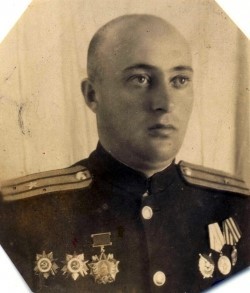Solomon Raskin was born in 1916 in Minsk, Belorussia. His mother, a schoolteacher, died in 1924. In 1930, he began to work at a machine-building factory in his city. In 1935, he became a student at the Leningrad Institute of Railway Engineering (now known as the St. Petersburg State Transport University, Russia). In 1937, he was drafted into the navy and sent to the M.V. Frunze Higher Naval School in Leningrad, from which he graduated in 1939.
When the Soviet-German war began in June 1941, Lieutenant Solomon Raskin was serving with the Northern Fleet of the Red Navy. His first appointment was as the commander of a motorboat, and he was later promoted to commander of a motorboat detachment. In this capacity, he dealt mainly with landings and embarkations, the mining of sea lanes, etc. From 1942 on, Captain Lieutenant Raskin and his ship took part in escorting Arctic convoys from Britain and North America to the Soviet Union. These convoys were dispatched as part of the Lend-Lease Agreement concluded by the Soviet Union and the US Government in October 1941. As the commander of a "big hunter boats [BO]" group, Raskin had to repeatedly leave the Murmansk port to hunt for U-boats threatening the Allied vessels. In one case, Raskin was ordered to capture (!) a German U-boat transporting important documents. Raskin's sea hunter ship skillfully disabled (rather than destroyed) the submarine, forcing it to surface, whereupon the U-boat and its crew were captured. For that action, Captain of the 3rd Rank Raskin was awarded the Order of Alexander Nevsky (an award given to military commanders for outstanding combat leadership). In 1944, Solomon Raskin was transferred to the Black Sea Fleet, once again serving as commander of a "big hunter boats [BO]" battalion. Raskin was awarded a total of five military orders, in addition to several medals.
After the liberation of Minsk in June 1944, Raskin learned that his father had killed by the Nazis, while his sister Dina had been raped and tortured to death. The desire to take revenge on the Nazis was an important motivation for Raskin till the end of the war.
After the end of the war, Solomon Raskin settled in Kerch, the Crimea. Although he married a non-Jewish woman, he gave his daughter the Jewish name "Dina", in commemoration of the sister killed by the Nazis. In 1956, the 40-year-old Captain of the 1st rank Raskin was discharged from the Soviet navy. After retiring from military service, he worked at the Kerch ship repair plant. Solomon Raskin died in 1973.







